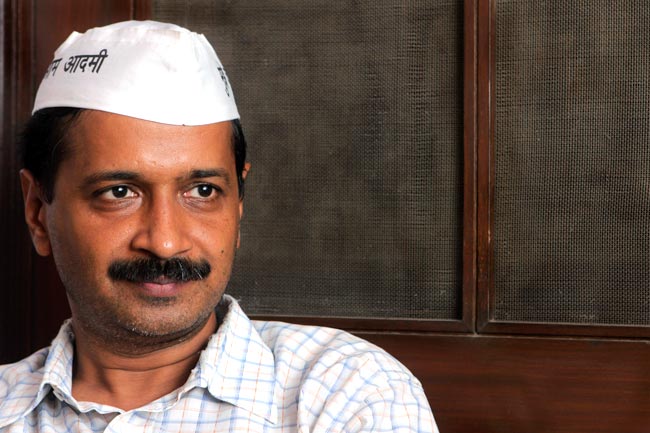BJP And AAP in Line to Pick Up Congress Votes in Delhi
Arvind Kejriwal

NEW DELHI: The battle for Delhi will be between the BJP and the Aam Aadmi Party with the Congress party completely out of its depth. Its vote is expected to scatter in the forthcoming Assembly elections with both the other parties trying to put themselves in position to mop up this vote, as well as consolidate their respective support base.
AAP is having a rough time countering rumours. From the ‘bhagoda’ charge its leader Arvind Kejriwal now finds himself at the centre of a whisper campaign suggesting he is close to the BJP and is working in tandem with the party he “claims” to oppose. To counter this his party members point to his decision to fight against Prime Minister Narendra Modi in the Varanasi Lok Sabha polls, where he emerged as the only candidate to give a fight to the BJP leader.
However, lending strength to this rumour is Kejriwal’s failure to visit the resettlement colonies around Delhi that are in the grip of communal tensions. At least five to six Assembly seats are affected by this violence directly, with the impact of polarisation expected to be felt by many more. After reports from the ground AAP decided not to give a ticket to its legislator from Trilokpuri who had vanished from view in the midst of the violence but so far its own president Kejriwal has not visited the affected areas. In fact several residents in Trilokpuri referred to his absence as well, wondering why he had not visited the riot affected areas.
Two major issues continue to dog AAP, apart from the absence of media attention and the increasingly uncertain profile being created for Kejriwal by the political rumour machinery of Delhi. This according to AAP members is fed into by both the Congress and the BJP that look upon the party as its main opponent.
The first issue is factionalism, and the different viewpoints that seem to have placed AAP in a perpetual power struggle. Many of its members are recognised as playing a ‘double game’ being part of the party but also in close touch with their erstwhile colleagues who have joined the BJP over the past weeks and months. There is also a more progressive core within the party that has its own opinion on issues, with Kejriwal vacillating between the two points and not very keen to rock the boat in favour of either.
The second issue, is organisation where it has made some headway. AAP was a fluid body that its main leaders used to insist was its strength. Its stance in the last Assembly elections was that it was for the people at large, and not for any segment or caste or creed. Kejriwal rested his entire campaign on the issue of corruption and while this remains the plank for these polls as well, AAP is looking to strengthen its intervention amongst women, youth, middle class as well as the minorities. It has set up special units for the same, and from being fairly ambivalent earlier it has now 300 women working at the ward levels which is a major shift from the past. The minority cell is likely to be activated although Sikh and Muslim members have been appointed. And special efforts are being made to address the youth and the middle class through specific programs and interaction.
The BJP, on the other hand, has decided to again depend on the charisma of PM Modi and field him as its star campaigner. Like the Congress party it has decided not to field a chief minister before the elections, and allow the Prime Minister to ‘work his magic’ on the electorate. Delhi’s middle class along with the others is still enthused and the little shift that might have been possible from amidst the poor has been taken care of through the communal violence and subsequent polarisation that is expected to favour the BJP.
Factionalism is a major organisational issue for the BJP as well that, after initial qualms, has gained in confidence after the Haryana and Maharashtra elections where PM Modi was able to swing the vote substantially in its favour. Delhi is seen as a far more “friendly” city at the moment with the BJP clear that after the expected victory it would appoint a chief minister of PM Modi’s choice. As has been done in Maharashtra where the RSS has had to concede ground to the Prime Minister and his man friday BJP president Amit Shah insofar as the choice of chief minister in Devendra Fadnavis was concerned.
AAP leaders are optimistic, however, that the efforts being put into revving up the organisation will yield results and that Kejriwal’s campaign will still be able to attract the voters. However, they admit to a tough battle ahead, and the confidence visible earlier when AAP had openly predicted a win, is missing. The party has been in some disarray and Kejriwal himself not on the same ascendant as he was before.



